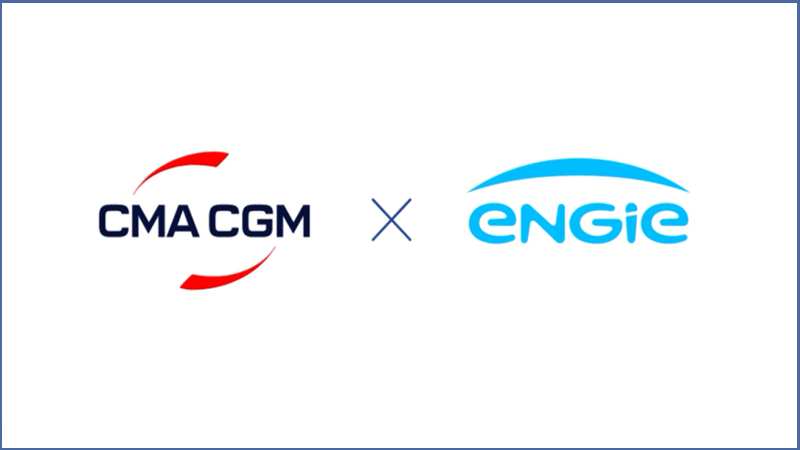The CMA CGM Group, a global player in sea, land, air and logistics solutions, and ENGIE, a global leader in low-carbon energy and services, announced plans to co-invest in the Salamander project – the first industrial and commercial unit for second-generation biomethane production – and their intention to produce up to 200,000 tons of renewable gas annually worldwide by 2028, to meet the needs of CMA CGM and the shipping industry.
Majority-owned by ENGIE and the CMA CGM Group, the site is being considered to be located in Le Havre, backed by the support of the Havre Seine Métropole urban community via the investment program “Le Havre, Ville portuaire intelligente” (Le Havre, a smart port city). The unit will be fueled by dry biomass from local wood-waste sources, along with solid recovered fuel, and will produce the biomethane via pyrogasification. The site will aim to produce 11,000 tons of biomethane annually, starting in 2026.
The two groups plan to finalize their investment decision in late 2022. A funding request has been submitted to the European Commission's Innovation Fund. By developing the renewable gas industry and the Salamander project, both CMA CGM and ENGIE will help achieve the energy independence and energy transition goals set forth by the European Commission in the RepowerEU plan.
An objective up to 200,000 tons of renewable gas annually worldwide by 2028
The CMA CGM Group and ENGIE have taken this opportunity to state their intention to increase annual production of renewable gas in Europe and worldwide to 200,000 tons by 2028, both to meet CMA CGM's needs and those of the shipping industry. The Salamander project will help reach that target.
The CMA CGM Group, which aims to achieve net-zero carbon by 2050, already has a fleet of 30 dual-fuel "e-methane ready” ships in operation – a figure that will rise to 77 by the end of 2026.
The dual-fuel engine technology developed by CMA CGM, which currently runs on LNG, is already capable of using bioLNG, as well as synthetic methane. This fuel reduces greenhouse gas emissions by up to 67% compared with Very Low Sulphur Fuel Oil (VLSFO) from well to wake (the complete value chain). Against this backdrop, CMA CGM and ENGIE are pledging their commitment to promoting the development of the renewable gas sector at an industrial scale.
Salamander: local renewable energy and a concrete commitment to the Le Havre region
Salamander is the culmination of both groups' desire to promote production and distribution sectors for renewable gas in Europe – particularly in France. It is the application on an industrial scale of 10 years of research and development conducted by ENGIE1 within the framework of the GAYA project, which has demonstrated the technical, economic and environmental viability of producing renewable gas.
The Salamander project also reflects CMA CGM’s close-knit connection with the Le Havre region, where the site is being considered. CMA CGM is the largest local maritime company in terms of market share, operating in the region since 1994. Its roots can even be traced back to 1863 as CGM. 15 weekly connections serve the port of Le Havre – an illustration of its strategic importance to the CMA CGM Group – and the local office employs a staff of over 400 employees.
Two French groups committed to the Coalition for the Energy of the Future to support sustainable mobility
CMA CGM and ENGIE have also been working together for several months within the Coalition for the Energy of the Future, launched at the end of 2019 during the “Assises de l’Economie de la Mer” by Rodolphe Saadé and supported by President of the French Republic, Emmanuel Macron. The two companies continue to work within the Coalition to ramp up the development of the energies and technologies of the future, to support new models of sustainable mobility and reduce the climate impact of transport and logistics.
Christine Cabau Woehrel, Executive Vice President Assets and Operations at CMA CGM said: “To reach our target of net-zero carbon by 2050, the CMA CGM Group is seeking to form solid industrial partnerships, led by this initiative with ENGIE that aims to produce up to 200,000 tons of renewable gas annually by 2028. Salamander is the first industrial ramp-up to emerge from the partnership, an advanced pilot helping to develop the renewable gas sector, in keeping with the goals of energy independence and the energy transition set forth by the European Commission in the RepowerEU plan.”
Edouard Sauvage, Executive Vice President Infrastructure at ENGIE, said: “ENGIE is innovating with a new local production method for second-generation biomethane using wood waste, underpinned by an energy production technology involving pyrogasification. The scale of the project reflects our ambitions and accelerated development in renewable gas production. It demonstrates our ability to support leading companies in their transition to net zero. We are delighted and proud to be carrying out this initiative in partnership with CMA CGM, moving forward together in this important milestone in our efforts to promote the energies of the future”.









